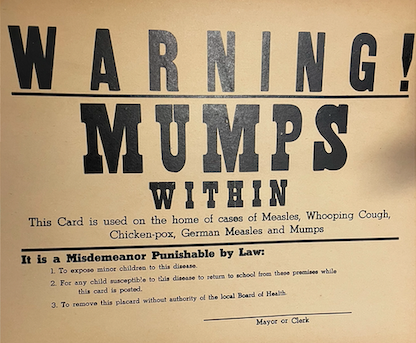Encyclopedia Dubuque
"Encyclopedia Dubuque is the online authority for all things Dubuque, written by the people who know the city best.”
Marshall Cohen—researcher and producer, CNN
Affiliated with the Local History Network of the State Historical Society of Iowa, and the Iowa Museum Association.
MUMPS
MUMPS. Beginning with a low-grade fever and muscle aches, mumps progresses to a swelling of the glands around the jaw line. Symptoms appear from 12 to 25 days after infection and can last for eighteen days. Iowa had been averaging five cases of mumps annually before an outbreak in 2006, the worst outbreak in twenty years. An estimated one-fourth of the reported 245 patients were in college. Of those 245 cases, 90 occurred in Dubuque. Ironically, the majority of the cases occurred in people who received the proper two doses of the measles-mumps-rubella (MMR) vaccine. Reports indicated the vaccine did not work in 5% of those vaccinated. (1)
In 1949 doctors were already warning Iowans of the health effects of mumps, an illness commonly occurring in the spring. If the virus also invades the organs of reproduction, a painful inflammatory condition could result in complete sterility. Those showing indications of the disease were warned to see a physician. (2) A new vaccine apparently 100% effective was announced in 1966. (3)
---
Source:
1. Centers for Disease Control and Prevention, Telegraph Herald, April 4, 2006, p. 1
2. "Mumps Can Be Serious," Telegraph-Herald, April 6, 1949, p. 9
3. "Dad-Daughter Teas Tames "Mumps," The Telegraph-Herald, June 26, 1966, p. 12


